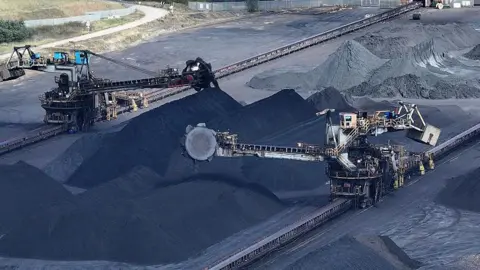Business reporter, BBC News
 Getty Images
Getty ImagesBritish Steel’s blast furnaces are set to continue running after the government secured delivery of key raw materials.
Coking coal and iron ore from the US will be unloaded at Immingham docks and transported to British Steel’s Scunthorpe site on Tuesday after a scramble for supplies.
A separate shipment of materials is back on its way to the UK from Australia after a legal dispute over who owned the cargo was resolved between the government and British Steel’s owner Jingye.
The government seized control of the business over the weekend following a breakdown in talks with its Chinese owner amid accusations it was planning to switch the furnaces off.
Industry minister Sarah Jones confirmed there was a shipment at Immingham.
Business Secretary Jonathan Reynolds will travel to the port in north east Lincolnshire on Tuesday to see the raw materials transferred to British Steel.
Jones told the BBC’s Today programme: “We have other shipments coming from the US, from Australia and orders from Sweden so we are in a steady state in terms of the operation of those two blast furnaces.”
The government said the materials from the US would be enough to keep the steel-producing furnaces running for the coming weeks and added officials were working to “get a steady pipeline of materials to keep the fire burning”.
If the furnaces were starved of fuel and went out, the UK would no longer have the capability to produce so-called virgin steel, due to the process of restarting them being extremely difficult and costly.
Virgin steel-making involves iron being extracted from its original source to be purified and treated to make all types of steel used in major construction projects, such as new buildings and railways.
The materials have been paid for by the government, which Jones said are covered by existing budgets.
“We have a £2.5bn fund for steel within the Department for business so we won’t be drawing down on any extra resources and people can be reassured of that,” she said.
The plant, which employs 2,700 people, is said to be in a “far better position” as a result of the government’s intervention, according to union officials.
In terms of future ownership of the plant, Jones said: “We are hoping, as you know, to bring in a private sector partner as part of the future of Scunthorpe but those conversations are ongoing.”
Relationship breakdown
Beijing has accused the British government of “politicising trade co-operation”, and said its move to take control of British Steel had raised doubts about investment in the UK.
On Saturday, an emergency law was rushed through Parliament, giving the government control of the site to prevent Jingye from closing the furnaces against ministers’ wishes.
The situation at the site has raised questions about Chinese investment in industries the government has deemed strategically critical.
The government has so far stopped short of taking British Steel back into full public ownership, but has not ruled out nationalisation, while also looking for potential private investors to fund operations.
Two long-standing British Steel employees have been appointed to run the plant on an interim basis.
In March, Jingye said its Scunthorpe site was losing £700,000 a day, which it said was “no longer financially sustainable”, and the company began a consultation on job cuts.
Talks between officials and Jingye last week failed to produce a breakthrough.
The government said the company had rejected an offer of £500m in public money to help keep the furnaces operating, and had demanded more than twice as much with few guarantees it would keep the plant open.
“We were working in good faith on what we thought was a good deal on the table,” said Jones.
“That relationship broke down when, in the middle of a consultation about the future of the site, they refused to buy the raw materials to keep that site going. That was an act of bad faith and that’s why we had to intervene in the way that we did.”
Reynolds previously said it “became clear” that Jingye was intent on closing down the blast furnaces no matter the financial support offered, prompting the government to secure control of the site.

Get our flagship newsletter with all the headlines you need to start the day. Sign up here.















